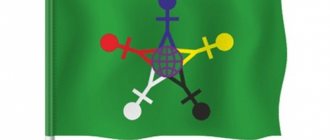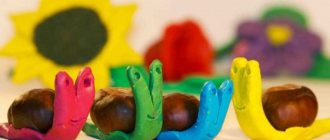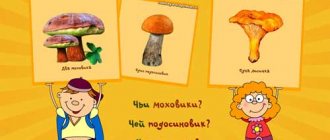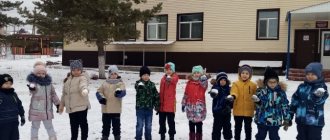Summary of a speech therapy lesson for Defender of the Fatherland Day, types of military professions
Summary of lesson No. 1 on the topic “Defender of the Fatherland Day”
Goal: to expand children's understanding of Defender of the Fatherland Day.
Tasks:
- Continue to teach children to answer the teacher’s questions with complete answers.
- To develop children's ability to navigate in the space of a sheet.
- Develop attention, memory, thinking, fine motor skills.
- To instill in children a love for the Motherland, to evoke a desire to defend it.
Equipment: demonstration material: subject and subject pictures on the topic; visual material for the game “What’s where?”
Handouts: album sheets, pictures of an airplane, tank, ship, figures of a sailor, tanker, pilot.
Progress of the lesson
I. Org. moment.
Introduction to the topic of the lesson. The teacher reads a poem about February 23: When ice lies on the rivers and the blizzard rushes into the distance, Thoughtful February brings us a wonderful holiday.
The holiday of all soldiers, Defenders, fighters will come. Everyone will be happy to congratulate both grandfathers and fathers!
II. Work on the topic of the lesson.
1. Conversation about the holiday Defender of the Fatherland Day.
- Guys, think and tell me what holiday was mentioned in the poem? (About the holiday of February 23.) The teacher puts a plot picture on the topic on the typesetting canvas. — That’s right, guys, February 23 is Defender of the Fatherland Day. You know that we live in a country called Russia. Russia is our Fatherland. We call our country Fatherland because our fathers, grandfathers and great-grandfathers lived in it. - So, guys, who do we call Defenders of the Fatherland? Who guards and defends our Motherland? (Soldiers.) The teacher puts the corresponding picture on the typesetting canvas. - Only men can be soldiers, because they are very strong and brave. Soldiers defend our Motherland. A soldier is always a protector, he protects every child, protects his life, his home.
2. The teacher’s story about the types of military professions.
The speech therapist shows a picture of an airplane. - What is this? (This is an airplane.) Yes, he is military. Who do you think is flying the plane? (Pilot.) The teacher shows the children a picture of a pilot. Similar work is carried out with pictures of a tank and a tank driver, a ship and a sailor.
III. Physical education minute.
We are still preschool children, we don’t walk like soldiers, One, two, in step, three, four, step harder, Soldiers go to the parade, they are brave guys. (they march and salute at the end)
IV. Continuation of work on the topic of the lesson.
1. D/i “What’s where?” In front of each child on the table is a landscape sheet and pictures of an airplane, tank, ship, tank driver, pilot, sailor. The teacher has enlarged pictures of handouts on the board. The speech therapist gives the children the following task: - Let’s put a tank in the center of the sheet (shows a sample). Find a figurine of a man who is driving a tank and place him in the tank. What is the name of this profession? Place the plane at the top right of the tank. Find a figurine of a man flying a plane and put him on the plane. What is the name of this profession? To the left of the tank below is a ship. Find a figurine of a man who serves on the ship and put him on the ship. What is the name of this profession?
2. D/exercise “Who controls what?” The exercise is carried out based on the material from the previous task.
V. Summary
Summary of lesson No. 2 on the topic “Defender of the Fatherland Day”
Goal: to continue to expand children's understanding of Defender of the Fatherland Day.
Objectives: 1. Continue teaching children to repeat the story after the speech therapist. 2. Develop children’s ability to answer the teacher’s questions in complete sentences. 3. Develop attention, memory, thinking, fine motor skills. 4. To instill in children a love for the Motherland, to evoke a desire to defend it.
Equipment: demonstration material: subject pictures of military professions and equipment; pictures for telling about Defender of the Fatherland Day. handouts: cards depicting military professions, individual sheets for the game “Who Needs What,” pencils.
Progress of the lesson
I. Org. moment
1. The teacher distributes cards with military professions to the children. D/exercise “The one who names the profession drawn on the card will sit down.”
II. Work on the topic of the lesson.
1. D/i “Name a military profession” -What holiday will we celebrate soon? Who are the defenders of our Motherland? (Soldiers.) That’s right, you and I know that soldiers have different professions. Tell me guys, who is flying the plane? Who needs a tank for work? Who flies in the sky and protects our country? As the children answer, the teacher places corresponding pictures on the typesetting canvas. 2. D/i “Who controls what?” 3. Repeating a short story about the holiday Defender of the Fatherland Day after a speech therapist. The teacher puts pictures on the typesetting canvas and says: -February 23 is Defender of the Fatherland Day. Defenders are a tanker, a sailor, a pilot. A tank driver controls a tank, a pilot controls an airplane, and a sailor controls a ship.
III. Physical education minute.
IV. Continuation of work on the topic of the lesson.
1. Repetition of the story about Defender of the Fatherland Day. 2. Pause for children to think about the story. 3. Repeating the story by children about Defender of the Fatherland Day after a speech therapist. 4. Work with handouts “Who needs what for work? Draw a path."
V. Summary
Summary of lesson No. 3 on the topic “Defender of the Fatherland Day”
Goal: to consolidate children’s knowledge about the holiday Defender of the Fatherland Day.
Objectives: 1. Continue to teach children how to narrate a text together with a speech therapist. 2. Develop children’s ability to solve descriptive riddles. 3. Develop attention, memory, thinking, fine motor skills. 4. Foster love for the Motherland, instill a desire to defend it.
Equipment: demonstration material: subject and plot pictures on the topic; pictures for the story “Brave Soldier”. handout: copybook.
Progress of the lesson
I. Organizational moment
1. The teacher distributes cards with military professions to the children. D/exercise “The one who names the profession drawn on the card will sit down.” II. Work on the topic of the lesson.
1. D/i “Guess by the description.” - This is a soldier. He flies the plane. (Pilot.) - This soldier serves on the ship. (Sailor.) - This soldier controls the tank. (Tank driver.) 2. D/i “Name your military profession.” 3. Conversation about the holiday Defender of the Fatherland Day. 4. A speech therapist’s story based on a series of narrative paintings about a brave soldier. -One day a soldier was sitting on a bench and reading a book. Suddenly, on the river bank, he saw a girl feeding ducks. Suddenly the girl bent over and fell into the water. The soldier saw this, ran up and saved the girl. The soldier is a true hero! 5. Conversation based on the story. -Who was sitting on the bench? - What was he doing? —Who did the soldier see on the river bank? - What was the girl doing? - What happened to the girl? -What did the soldier do? -What can we say about this soldier? - What would you do in his place?
III. Physical education minute
IV. Continuation of work on the topic of the lesson. 1. The speech therapist and children share text based on pictures. 2. Working with copybooks.
V. Summary
17.02 Lexical topic “Defender of the Fatherland Day.”
1. Conversation about the holiday Defender of the Fatherland Day. — February 23 is the Defender of the Fatherland Day. You know that we live in a country called Russia. Russia is our Fatherland. We call our country Fatherland because our fathers, grandfathers and great-grandfathers lived in it. —Who do we call Defenders of the Fatherland? Who guards and defends our Motherland? (Soldiers.)
2. An adult’s story about the types of military professions. An adult looks at pictures of military professions with a child. - Who do you think is flying the plane? (Pilot.) Similar work is carried out with pictures of a tanker and sailor.
3. D/exercise “Who controls what?” -The tank driver controls the tank; the sailor steers the ship; The plane is controlled by the pilot.
18.02. We repeat the material from 17.02.
20.02.
1. D/i “Name a military profession” - What holiday will we celebrate soon? Who are the defenders of our Motherland? (Soldiers.) That's right, you know that soldiers have different professions. Tell me, who is flying the plane? Who needs a tank for work? Who flies in the sky and protects our country? Let's look at the corresponding pictures. 2. D/i “Who controls what?” 3. Repeating a short story about the holiday Defender of the Fatherland Day after an adult. An adult shows the child pictures and says: -February 23 is Defender of the Fatherland Day. Defenders are a tanker, a sailor, a pilot. A tank driver controls a tank, a pilot controls an airplane, and a sailor controls a ship. 4. Pause for the child to think about the story. 3. The child independently repeats the story after the adult.
21.02.
1. D/i “Guess by the description.” - This is a soldier. He flies the plane. (Pilot.) - This soldier serves on the ship. (Sailor.) - This soldier controls the tank. (Tank driver.) 2. D/i “Name your military profession.” 3. Conversation about the holiday Defender of the Fatherland Day. 4. An adult’s story based on a series of plot paintings about a brave soldier. -One day a soldier was sitting on a bench and reading a book. Suddenly, on the river bank, he saw a girl feeding ducks. Suddenly the girl bent over and fell into the water. The soldier saw this, ran up and saved the girl. The soldier is a true hero! 5. Conversation based on the story. - Who was sitting on the bench? - What was he doing? —Who did the soldier see on the river bank? - What was the girl doing? - What happened to the girl? -What did the soldier do? -What can you say about this soldier? - What would you do in his place? 6. An adult and a child share text based on pictures.
17.02. Lexical topic “Defender of the Fatherland Day”
1. Conversation about the holiday Defender of the Fatherland Day. -Guys, think and tell me what holiday we will celebrate soon? The teacher puts a plot picture on the topic on the typesetting canvas. - That's right, guys, February 23 is Defender of the Fatherland Day. You know that we live in a country called Russia. Russia is our Fatherland. We call our country Fatherland because our fathers, grandfathers and great-grandfathers lived in it. -So, guys, who do we call Defenders of the Fatherland? Who guards and defends our Motherland? (Soldiers.) The teacher puts the corresponding picture on the typesetting canvas. -Only men can be soldiers, because they are very strong and brave. Soldiers defend our Motherland. A soldier is always a protector, he protects every child, protects his life, his home. 2.Teacher’s story about the types of military professions. The teacher displays a picture of an airplane. -What is this? (This is an airplane.) Yes, he is military. Who do you think is flying the plane? (Pilot.) The teacher shows the children a picture of a pilot. Similar work is carried out with pictures of a tank and a tank driver, a ship and a sailor. 3.D/control “Who controls what?” -The tank driver controls the tank; the sailor steers the ship; The plane is controlled by the pilot.
18.02. We repeat the exercise. from 17.02.
20.02. 1. D/i “Name a military profession”
— What holiday will we celebrate soon? Who are the defenders of our Motherland? (Soldiers.) That’s right, you and I know that soldiers have different professions. Tell me guys, who is flying the plane? Who needs a tank for work? Who flies in the sky and protects our country? As the children answer, the teacher places corresponding pictures on the typesetting canvas. 2. D/i “Who controls what?” 3. Repetition of a short story about the holiday Defender of the Fatherland Day after the teacher. The teacher puts pictures on the typesetting canvas and says: -February 23 is Defender of the Fatherland Day. Defenders are a tanker, a sailor, a pilot. A tank driver controls a tank, a pilot controls an airplane, and a sailor controls a ship. 4. Repetition of the story about Defender of the Fatherland Day. 5. Pause for children to think about the story. 6. Repeating the story by children about Defender of the Fatherland Day after a speech therapist.
21.02. 1. D/i “Guess by the description”
- This is a soldier. He flies the plane. (Pilot.) - This soldier serves on the ship. (Sailor.) - This soldier controls the tank. (Tank driver.) 2. D/i “Name your military profession.” 3. Conversation about the holiday Defender of the Fatherland Day. 4. A teacher’s story based on a series of narrative paintings about a brave soldier. -One day a soldier was sitting on a bench and reading a book. Suddenly, on the river bank, he saw a girl feeding ducks. Suddenly the girl bent over and fell into the water. The soldier saw this, ran up and saved the girl. The soldier is a true hero! 5. Conversation based on the story. - Who was sitting on the bench? - What was he doing? —Who did the soldier see on the river bank? - What was the girl doing? - What happened to the girl? -What did the soldier do? -What can we say about this soldier? - What would you do in his place? 6. The speech therapist and children share text based on pictures.
Author of the material: Burova Anna Olegovna
Also on topic:
Homework on the lexical topic: “Defender of the Fatherland Day”




